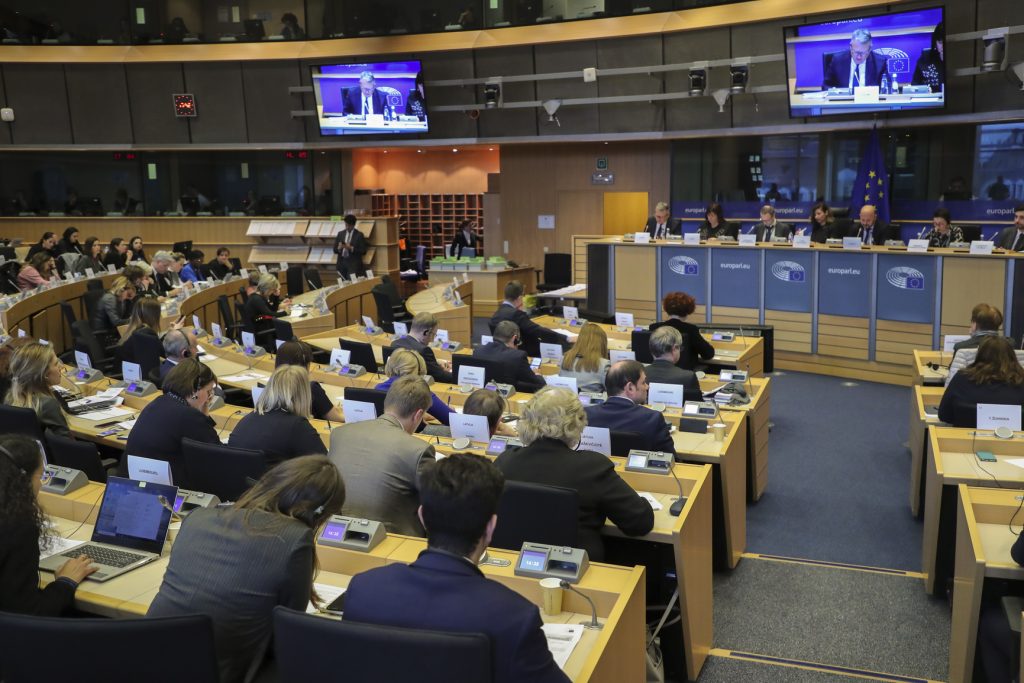Maria Schinina is an official representative of the Italian Chamber of deputies to the European Parliament and participant in the IEE Executive Certificate in European Union Studies – MEUS. She discusses rule of law conditionality in this text written for the Jean Monnet Module in the IEE’s Executive Education programme. This article reflects solely the personal opinion of the Author
Based on art. 2 TEU, as constantly interpreted by the Court of Justice, the rule of law is a foundational principle of the EU. Recent challenges in some Member States – discussed at the IEE-ULB in the framework of the Jean Monnet Module Rule of law and Mutual Trust in Global and European Governance (599377-EPP-1-2018-1-BE-EPPJMO-MODULE) coordinate by prof. Ramona Coman – have showed the limits of the existing mechanisms and triggered the debate on how to better promote and protect it.
This policy brief tries to shed light on an unexplored facet of the debate: the role of the European parliamentary system, composed by the European Parliament (EP) and National Parliaments (NPs). The topic has recently emerged at EU institutional level from two different angles. The interparliamentary cooperation is seen, on the one hand, as a tool to promote the principle and develop a dialogue on safeguarding the rule of law; on the other hand, as a solution to the democratic legitimacy concerns which rise from the emerging of a new EU law of constitutional crisis, composed of mechanisms (such as the Rule of law framework or the recently proposed rule of law conditionality) lying outside the “normal” EU constitutional framework[1].
However, the institutional inputs have not been translated in stable new mechanisms of interparliamentary cooperation, differently from connected or comparable policy areas such as the Area of freedom, security and justice (involving fundamental rights and values strictly linked to art. 2 TEU) and the economic governance (where, similarly to the rule of law field, new tools have emerged beyond the Treaties, raising strong concerns in terms of democratic legitimacy). Furthermore, the already established interparliamentary fora have so far paid limited attention to the role of the interparliamentary cooperation in the rule of law area.
The existing interparliamentary fora
In 2019, the EU Speakers Conference[2] recognised the EP and NPs’ key task “to cooperate among themselves in order to effectively preserve and promote the art. 2 values”[3]; however, it has not specifically debated interparliamentary mechanisms in the field of rule of law.
Conversely, the COSAC[4] discussed the topic in 2016, in the context of the parliamentary dimension of the Dutch Presidency of the EU Council. It underlined “the NPs shared responsibility in upholding and fostering the rule of law and democratic governance” and supported “initiatives to establish permanent dialogue mechanisms in relevant fora on these matters”, proposing itself as “a platform for such inter-parliamentary dialogue”[5]. Nevertheless, the proposal did not have any follow-up and the role of the interparliamentary cooperation in the rule of law area was not debated by the following COSACs, although rule of law issues were in general terms addressed in the meeting organised under the Finnish Presidency[6].
The EP’s call on National Parliaments….
The EP has stressed the potentialities of the interparliamentary cooperation in the rule of law field since 2016, when proposed the Union Pact for democracy, the rule of law and fundamental rights (DRF)[7]. The Pact, to be concluded through an inter-institutional agreement, would be based on an annual report (including country-specific recommendations) on the state of democracy, rule of law and fundamental rights in the Member States. The report, drawn up by the European Commission in consultation with a panel of experts, would be the basis both for an annual dialogue in the Council (followed by conclusions), and for an annual interparliamentary debate organised by the EP (followed by a parliamentary resolution). The interparliamentary meeting would be more than an informal exchange on the rule of law. It would be “part of a multi-annual structured dialogue between the European Parliament, the Council, the Commission and national parliaments and it shall also involve civil society, the FRA and the Council of Europe”[8]; it is also envisaged as a step of a policy cycle, which can provide the formal ground for further actions (dialogue, infringement procedures, activation of art. 7 TEU) toward the State not compliant with one or more aspects related to the DRF. Moreover, the involvement of NPs would not be limited to the interparliamentary meeting; they would appoint the DRF panel (one expert per NP and ten experts designated by the EP) and the Council conclusions would invite them to provide a response to the European DRF Report, proposals or reforms.
The EP’s willingness to involve NPs in this area has been recently confirmed by its position on the proposal on the Rule of law conditionality[9], where, similarly to the Pact, the EP proposes an advisory panel of independent experts (one per NP and five appointed by the EP), assisting the Commission in its assessment of generalised deficiencies as regards the rule of law in Member States.
As for the European Commission, it supported the establishment of an inter-parliamentary dialogue on the rule of law[10] and, recently, suggested an annual interparliamentary event, calling on the European Parliament and national parliaments to develop specific interparliamentary cooperation on rule of law[11]. However, interparliamentary mechanisms do not have any specific relevance in the proposed Rule of Law Review Cycle.
…and the heterogeneous National Parliaments’ attitude.
Several NPs addressed rule of law challenges in the EU, both at domestic level, through political declarations or intervening on their respective Government, and at the European level, mainly scrutinising the EC proposals in the context of the political dialogue. As for the role of the interparliamentary cooperation, many Parliaments expressed the view that the existing fora can be a platform to discuss the rule of law and to further a dialogue on safeguarding it, such as on working towards a common understanding with regard to compliance with the rule of law[12].
However, on the basis of an empirical analysis of their contributions, NPs focus on the interparliamentary cooperation appears to be rather limited.
The interparliamentary meeting organised in 2017 by the EP LIBE Committee on the Pact for DRF offers a general view on NPs’ attitude towards the subject[13]. It registered strong objections from NPs to the EP’s Pact (mainly based on the respect of national sovereignty, the risk of overlapping with other tools and specific aspects of its functioning) and a diffused scepticism to the implementation of structured mechanisms of interparliamentary cooperation. This is confirmed by the lack of follow-up to the proposal launched by the Greek Member and endorsed by the EP rapporteur, to create a joint standing committee, composed of rapporteurs appointed by the EP and NPs.
In general, many NPs seem to confirm their traditional preference towards informal and deconstructed formats of interparliamentary cooperation also in the field of the rule of law. On the one hand, the Hungarian Parliament seems to be in line with this trend, adopting a “network” approach and excluding a role for COSAC as a platform for the interparliamentary dialogue[14]. This is confirmed by the latest initiative of the Hungarian Speaker to address a letter to the EP and NPs Presidents, asking support and cooperation on the recent coronavirus legislation, as fully in line with the country’s Constitution[15]; similarly, but clearly with a different political aim, it can be mentioned the sharing, through informal networks of interparliamentary cooperation, of the Polish Senate resolution in defence of impartiality of judges and independence of the judiciary[16].
On the other hand, two remarkable exceptions to the light approach to the interparliamentary dialogue are represented by the French Assemblée Nationale[17] and the Dutch Tweede Kamer. The French legislators expressly supported the EP Pact and proposed a voluntary “démarche commune” of NPs, based on the need of a strong political support for the implementation of the EU mechanisms directed to protect the rule of law[18]. The Dutch Tweede Kamer appointed a rapporteur on developments in relation to the rule of law in the EU, recommending greater cooperation with other national parliaments “in order for the necessary dialogue between representatives of the people to take place and, wherever possible, joint action to be taken”[19].
Two logics under discussion
The Euro-national parliamentary system and the multilevel field approach
The specificities of the area, linked with national sovereignty, partly explain the heterogeneous NPs’ approaches. They definitely prevent some of them from recognising the European relevance of domestic rule of law issues, through new stable interparliamentary mechanisms or a regular oriented use of the existing interparliamentary fora.
Conversely, the EP has constantly tried to associate National Parliaments via a structural involvement in the rule of law area. The EP, which plays limited functions in the formal mechanisms foreseen by the Treaty, seems to unleash the potential of the interparliamentary cooperation for asserting a stronger role in the area. The structural engagement of NPs is justified as a tool for addressing democratic concerns, but at the same time appears to be functional to redress the institutional unbalance between the different actors at EU level.
From a theoretical angle, the EP appears to (and takes advantage from) promote and drive the vision of the interparliamentary cooperation as expression of a Euro-national parliamentary system, based upon the idea that “the functions of representation, policy-setting and oversight – traditionally attributed to every legislature – are now necessarily networked and shared among the different parliaments in the EU”[20]. Conversely, a multilevel field approach (if not a lighter “network” approach), where the two channels interact through formal and informal mechanisms of interparliamentary cooperation, without fixed hierarchies and with overlapping constituencies[21], seems to inspire most NPs. They do not accept the EP’s lead in driving the interparliamentary processes and prefer informal fora of interparliamentary dialogue, without renouncing a role in the protection of the fundamental EU values through different mechanisms. The divergence between the two approaches produces a stalemate in the development of regular mechanisms of interparliamentary cooperation.
Similar dynamics are also observable in the AFSJ and economic governance, also characterised by a limited role of the EP and sensitive issues of national sovereignty[22]; nevertheless, they did not impede the establishment of formal mechanisms of interparliamentary cooperation. This seems mainly due to the fact that, in those areas, specific and constraining primary legal basis[23] pushed the EP and NPs to set up stable mechanisms of cooperation, while, in the rule of law field, the interparliamentary cooperation relies on the general “light” provision contained in art. 9, Prot. 1, TFEU[24]. The application of this provision clearly implies a common EP and NPs’ attitude toward a further development of the interparliamentary cooperation in the area.
Is the stalemate insuperable?
Based on the AFSJ and economic governance experience, the parliamentary dimension of the Presidencies played a major role in the development of interparliamentary mechanisms. In 2016, the Dutch Parliament launched the debate on the interparliamentary cooperation in this area, but the subject was ignored by the following Presidencies. The next Presidencies (in particular, Germany, Portugal and France) are expression of Parliaments particularly attentive to the EU rule of law dimension[25] and, in the case of the French Assemblée nationale, with a specific focus on the role potentially played by interparliamentary fora. A strong engagement from their side – combined with a renovated push from the EU institutions and the increasing attention to the topic from the civil society[26] – could be crucial for addressing the stalemate and further developing the interparliamentary cooperation in the area.
[1] Von Bogdandy, A. & Ioannidis, M., 2014, Systemic deficiency in the rule of law: What it is, what has been done, what can be done. Common Market Law Review, 1, pp. 85.
[2] The Conference of Speakers of the EU Parliaments is in charge of coordinating the interparliamentary EU activities (see The Stockholm Guidelines for the Conference of Speakers of EU Parliaments, adopted at the EU Speakers’ Conference in Stockholm on 15 May 2010).
[3] Conference of Speakers of the European Union Parliaments, Conclusions of the Presidency, 8 – 9 April 2019, Vienna.
[4] The Conference of Parliamentary Committees for Union Affairs of Parliaments of the European Union (COSAC), expressly based on art 10 Prot. 1 TFEU, promotes the exchange of information and best practice between national Parliaments and the European Parliament and submits contributions to the European Institutions.
[5] Contribution of the LV COSAC, The Hague, 12 – 14 June 2016.
[6] Contribution of the LXII COSAC. Helsinki, 1 – 3 December 2019.
[7] European Parliament resolution of 25 October 2016 with recommendations to the Commission on the establishment of an EU mechanism on democracy, the rule of law and fundamental rights (2015/2254(INL). The proposal has been reiterated several times, most recently in the EP resolution of 16 January 2020 on ongoing hearings under Article 7(1) of the TEU regarding Poland and Hungary (2020/2513(RSP).
[8] European Parliament resolution of 25 October 2016
[9] European Parliament legislative resolution of 4 April 2019 on the proposal for a regulation of the European Parliament and of the Council on the protection of the Union’s budget in case of generalised deficiencies as regards the rule of law in the Member States (COM(2018)0324 – C8-0178/2018 – 2018/0136(COD))
[10] EC, 17 January 2017, Follow up to the EP resolution on with recommendations to the Commission on the establishment of an EU mechanism on democracy, the rule of law and fundamental rights.
[11] EC, Communication on Strengthening the rule of law within the Union A blueprint for action, COM/2019/343 final.
[12] COSAC, 18 May 2016 Twenty-fifth Bi-annual Report. Developments in European Union Procedures and Practices Relevant to Parliamentary Scrutiny
[13] The video recording of the meeting is available here: https://multimedia.europarl.europa.eu/en/committee-on-civil-liberties-justice-and-home-affairs_20170622-0900-COMMITTEE-LIBE_vd
[14] COSAC, Twenty-fifth Bi-annual Report-Annex.
[15] https://hungarytoday.hu/house-speaker-kover-coronavirus-law-letter/.
[17] Résolution relative au respect de l’état de droit au sein de l’Union européenne, considérée comme définitive en application de l’article 151-7 du Règlement considérée comme définitive en application de l’article 151-7 du Règlement le 27 novembre 2018 , T.A. n° 194.
[18] Rapport fait au nom de la Commission des lois constitutionnelles, de la législation et de l’administration générale de la République sur la proposition de resolution européenne relative au respect de l’État de droit au sein de l’Union européenne (n° 1300).
[19] Report by the rapporteur on rule of law developments in the EU, completed on 13 March 2019 (Parliamentary document 21 501-02, No. 1976).
[20] Lupo, N. & Fasone, C., 2018. Interparliamentary cooperation in the composite European constitution, London: Hart Publishing Ltd.
[21] Crum, B. & Fossum, J.E., 2009. The Multilevel Parliamentary Field: a framework for theorizing representative democracy in the EU. European Political Science Review, 1(2), pp.249–271.
[22] For the economic governance, see Cooper, I., 2016. The politicization of interparliamentary relations in the EU: Constructing and contesting the ‘Article 13 Conference’ on economic governance. Comparative European Politics, 14(2), pp.196–214; for the AFSJ, Tacea, A., 2017. The role of national parliaments in the area of freedom, security and justice: High normative expectations, low empirical results. In Ripoll Servent, A & Trauner, F., The Routledge Handbook of Justice and Home Affairs Research. London: Routledge, 2018, pp. 434–444.
[23] Art. 88 and 85 TFEU concerning the parliamentary oversight respectively on Europol and Eurojust; art. 13 of the “Fiscal Compact”.
[24] According to this provision, “the European Parliament and national Parliaments shall together determine the organisation and promotion of effective and regular interparliamentary cooperation within the Union”.
[25] On several occasions, the German Bundestag and the Portuguese Parliament addressed rule of law issues in the EU through questions, hearings and parliamentary debates. The Bundesrat has extensively used the instrument of the political dialogue with the European Commission (recently on COM(2019)163 and the Rule of law conditionality).
[26] On the interparliamentary dialogue and the role of NPs, see the consultation on COM(2019)163, particularly the contributions from Open Society, Civil liberties Europe, Reconnect, ETUC, Bingham Centre, International Commission of Jurists (ICJ).





